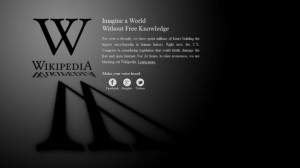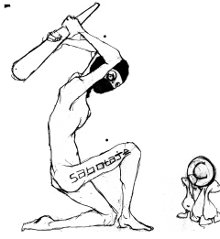Archivio per la categoria English
The lobbies of copyright flee. Netwar, final showdown?
SOPA and PIPA “undermine the internet’s fundamental architecture” professor James Boyle of Duke University said. And he is certainly right. Not by chance yesterday Massimo Gaggi on the Corriere della Sera reported the sarcasm of Chinese newspapers towards the implementation of the censorious barriers entailed by the approval of these bills. There is little space for rejoicing, to say it all. If by any (unlikely) mean the Stop Piracy Online Act and the Protect IP Act would succeed, even in their watered-down versions – against those initially proposed in US House of Representative and Senate – we would be witnessing a steady twist of the Internet as we knew it in the West.
The identity of the Internet – we should know it by now – is something temporary and the transformation of its main features (as, precisely, its architecture) is able to twist the practices of social communication that run through it.
And so what? The battles against SOPA and PIPA are most righteous ones, sacrosanct, to be absolutely won. At least in a tactical perspective. But please, let’s not picture these as battles for freedom of speech and, even less, to preserve those conditions of openness that turned Internet into the biggest agora in the history of mankind. The risk here is to jump out of the frying pan into the fire, without even realizing it. Prosegui la lettura »
Wikileaks – fragments of global disorder
Scritto da iff in Censura, English, Motori di ricerca, P2P, Traduzioni il Dicembre 13, 2010
The historical moment in which Wikileaks (WL) acts is decisive: – it’s the moment of the crisis of the United States’ military, political, cultural and technological hegemony.
 The fall of the second Wall of the 20th century (‘Wall’ Street) replicates the calls for glasnost (“openness”) and perestrojka (“change”) because, even if within its neoliberalist characterization, democratic ideology has experienced a degeneration.
The fall of the second Wall of the 20th century (‘Wall’ Street) replicates the calls for glasnost (“openness”) and perestrojka (“change”) because, even if within its neoliberalist characterization, democratic ideology has experienced a degeneration.
Reforming the system is the imperative, United States’ planetary overstretching reaches its limits from Iraq to Latin America; the executive power is weak and safeguarded by those who long for a reactionary, fundamentalist and authentically “American” resolution of the ideological crisis.
In this scenery, already complex on its own, a specter is starting to roam around, whispering in the ears of whoever it meets: “information in revolt will be writing history.”
InfoFreeFlow Interviews Captain Crunch
Scritto da iff in English, Hacking, Interviste, Net Neutrality il Ottobre 11, 2008
 Nothing can be said about John Draper, alias Captain Crunch,
Nothing can be said about John Draper, alias Captain Crunch,
a veritable "grandfather" of all hackers, without feeling a shiver of
admiration; from his pioneer exploits in introducing himself on Bell’s phone frequencies to his most famous prank to president Nixon, from the Homebrew Computer Club
experience to the development of EasyWriter, it can be said that the Captain made the history of computer science: and that’s why interviewing him has been even more exciting!
We did meet him at the MOCA2008 – an hacker camp, north-European style, organized during last august in Pescara, Italy, by Metro Olografix, historical virtual community among the most active on the Italian scene in the last decade – and here’s the result…
Web 2.0: Entropy of Selfmanaged Networks versus Distopy of Transparence
Scritto da iff in Chi siamo?, English, Sorveglianza, Web2.0? il Aprile 19, 2008
This year Info Free Flow‘s hank has unravelled through various interdisciplinary moments: as a miniature social network, this time an "analogical" one, heterogeneous tools were employed for a comparate examination of our technological milieu, tagging diversely from time to time the phenomena which interest us, and from which we are interested, and socializing them with others. In other words, by doing networking.
Networking means gathering heterogeneous experiences, reprocessing one’s acknowledgements in the light of others’ contributions and self-building physical, digital and mental frames appropriate to help progressing the exchange of ideas.
However, this is not enough. Crossing the main themes of last years’ computer science debate, a critique of the networking tool becomes appropriate in regard to a serie of its fruition nodes: what communicate and what not (privacy), by which means that can be achieved (web 2.0 rather than darknets), how to ensure data and profiles portability, which usage will be made of them (licence of appropriation of the transmitted information/knowledge by third parties and profiling).
However, two are the fields that define the type of network we are going to criticize; that is, the network infrastructure and hardware and the range of users that relate themselves to it with their own practices. Prosegui la lettura »
Who are we?
Scritto da iff in Chi siamo?, English il Gennaio 30, 2008
Info Free Flow is a counter-informational event on digital countercultures organized and looked after by the Laboratorio Occupato Crash in Bologna.
The technology-knowledge duo represents more now than ever one of the keystones of information society and it surely is one of the most important tools in the daily practices of biopolitical dominance over the individual.
An ever increasing extension and range of intellectual property and its juridical declentions, architectures which control and filter contents, social networks which retains very little "social" background, steady and systematical violation of the right to privacy are just few elements which make up the background for the steady informational flow of global networks.
Info Free Flow suggests socialization, spreading and debate of counter-knowledge, produced by processes of collective sharing and multipliable thanks to networks’ virality, usable for a wide-ranging re-appropriation of communication, against devastation of the political and cultural agora carried out by the corporations of information, show business and proprietary software, and by the ambiguities of the popular concept of "open society".
We want be able to learn and spread knowledge in a self-managed way. We want to think, fancy and play with technology outside fixed boundaries, going straight to its source, deconstructing it, reassembling it piece after piece to ending up disassembling it again, in accordance with our need or simply for fun, producing widespread skills and rebuffing any fragmentary "specialistic elitarism".
The event enjoyed, during the two editions of 2006-2007, attendance by some of the most important and active Italian underground ( and non-underground ) realities, in years on the hacking’s scene: the Autistici Inventati crew, the Winston Smith project, the MolleIndustria videogames designers, the research group Ippolita, the cultural agitators of Copydown and the Netsukuku developers.
In parallel to the more decidedly counter-informational moment, the Info Free Flow crew aims to realize, using esclusively open GNU/Linux software, media infrastructure open to accessibility, interactivity and usability from any user with any level of computer science alphabetization.
Not lastly, a goal of IFF lies into experimenting with web radios, darknets and informal use of wireless technology. For now, we started by cabling up entirely the Laboratorio Crash and building up a small Internet Point which we will made accessible to anyone who will visit us at the venue.
From information control to digital resistance
Scritto da iff in Censura, Chi siamo?, Copyleft, English, P2P, Privacy, Proprietà intellettuale, Sorveglianza, Trusted Computing, Videogames il Dicembre 4, 2006
Digital technology and expansion of internet gave life, since when they started to
spread broadly, to a veritable revolution of power relationships in the informational and communicational realm.
That is, it has made possible for an huge amount of people linked together to access, thanks to the
language of the bits, to broad quantities of information, to publish them and share them without any mediation
at all, nor any filter and therefore any censorship in their diffusion and browsing.
Growing
widespread use of these new technologies allowed the development of
complex social networks and virtual communities made up by real
individuals that, under the banner of creative cooperation and free
exchange of knowledge valourized their subjectivity (with the needs and
wishes it expressed), experimenting in a whole new lot of practises:
technical, political, artistical, novellistical, scientifical.
And everything about it takes place during a first phase much alien to state and governative control and market
influence, whose role first is reconsidered, then objected and finally well opposed. Prosegui la lettura »



Ultimi commenti